[ESP | ENG] ADMIRACIÓN - Trabajé de albañil durante 7 meses | ADMIRATION - I worked as a bricklayer for 7 months.
Hola Hivers! Bienvenidos nuevamente a mi blog. Espero que tengan un buen fin de semana. Quiero recordar, junto a ustedes, mi experiencia al trabajar de albañil durante 7 meses. La comparto en esta comunidad, ya que quisiera compartir algunos sentimientos, emociones y sensaciones que me surgieron al vivir esta experiencia.
Hello Hivers! Welcome back to my blog. I hope you have a great weekend. I want to remember, together with you, my experience working as a bricklayer for 7 months. I share it in this community, because I would like to share some feelings, emotions and sensations that came to me when I lived this experience.
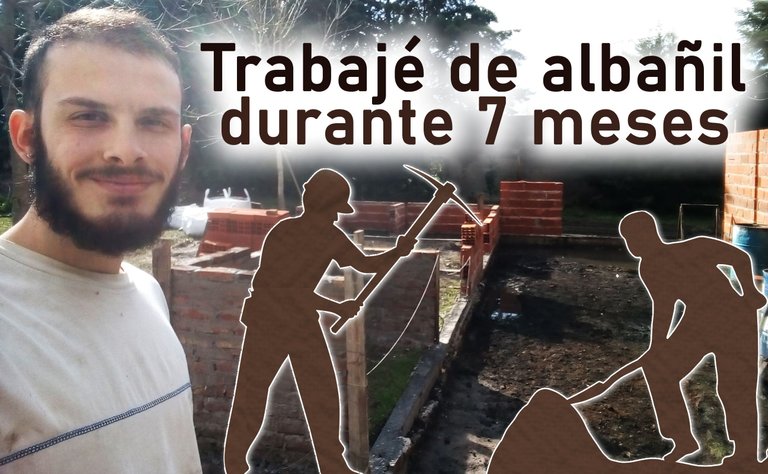
Todo comenzó meses después del inicio de la pandemia. Mi padre tiene una casa pequeña y modesta que pudo construir hace más de diez años, y en el año 2020 le surgió la posibilidad de expandirla.
Leonardo, su amigo de la infancia, es taxista pero sabe mucho sobre albañilería, ya que aprendió de su padre y trabajó mucho con él, un albañil de pura vocación. Debido al confinamiento producido por la pandemia, se quedó sin poder trabajar. De a poco (mes a mes), se iban reabriendo las actividades sociales y su trabajo se estaba reactivando, pero no era suficiente. Con una familia a la cual sustentar, necesitaba generar dinero, ya que sus ahorros se estaban agotando.
Mi padre supo de su situación y le propuso que trabaje para él liderando la construcción de la casa. Era un grupo de trabajo bastante modesto, conformado por Leonardo (el albañil), mi padre (empleado de correo postal) y yo (en ese entonces estudiante de música, aunque tuve que relegarlo). Mi padre y yo no teníamos experiencia en albañilería; él tenía algunos conocimientos básicos, ya que es de esas personas curiosas que le gusta saber un poco de todo, pero yo no tenía ninguna experiencia ni conocimiento del rubro.
En principio, mi trabajo era hacer todas las tareas de fuerza, y a su vez ayudar en lo que pueda, ser un peón y estar al servicio de Leonardo, quien era el capataz de la obra.
It all started months after the pandemic began. My father has a small, modest house that he was able to build more than ten years ago, and in 2020 he had the opportunity to expand it.
Leonardo, his childhood friend, is a cab driver but knows a lot about masonry, as he learned from his father and worked a lot with him, a mason by pure vocation. Due to the confinement caused by the pandemic, he was unable to work. Little by little (month by month), social activities were reopening and his work was being reactivated, but it was not enough. With a family to support, he needed to generate money, as his savings were running out.
My father heard of her situation and proposed that she work for him leading the construction of the house. It was a fairly modest work crew, consisting of Leonardo (the bricklayer), my father (a postal employee) and me (at the time a music student, although I had to relegate him). My father and I had no experience in masonry; he had some basic knowledge, as he is one of those curious people who likes to know a little about everything, but I had no experience or knowledge of the trade.
In principle, my job was to do all the strength tasks, and in turn to help in any way I could, to be a laborer and to be at the service of Leonardo, who was the foreman of the construction site.

Lo primero fue sacar el nivel, clavar estacas en donde posteriormente se harían los pilotines (columnas), echar el hilo, y cavar una profundidad de 20 cm para hacer las vigas de cimentación.
The first step was to remove the level, drive stakes where the piles (columns) would later be made, lay the thread, and dig to a depth of 20 cm to make the foundation beams.
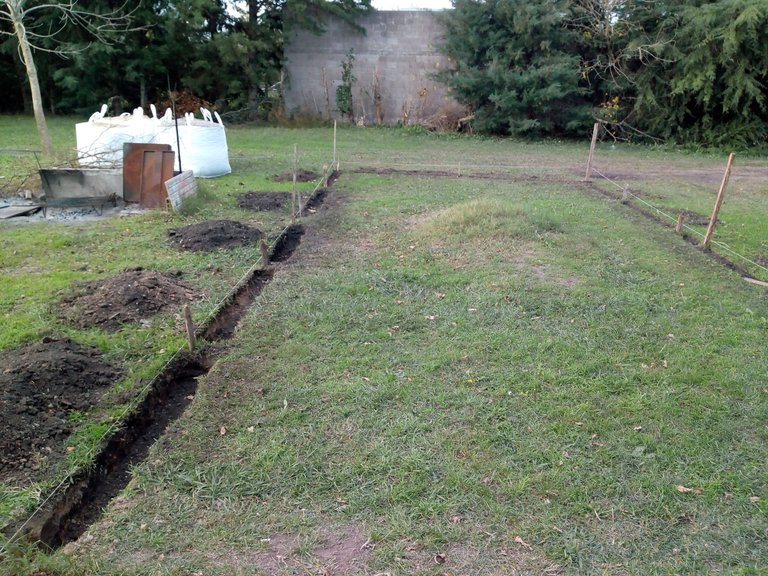
Aprendí a armar las estructuras, vigas y columnas. Esto se hacía con barras longitudinales de fierro, uniéndolas con los estribos, atando estos en cada extremo con alambres. Una vez hechas las estructuras, las colocábamos y las rellenábamos de concreto, formando así los cimientos. Luego de hacer los cimientos, levantamos las paredes. Mientras tanto yo cavaba y quitaba la tierra del espacio, preparando el terreno para, posteriormente, agregar la tosca (un tipo de tierra más dura e impermeable), esto genera que el piso se asiente mejor al suelo.
I learned to assemble the structures, beams and columns. This was done with longitudinal iron bars, joining them with stirrups, tying them at each end with wires. Once the structures were made, we placed them and filled them with concrete, thus forming the foundations. After the foundations were made, we erected the walls. Meanwhile I dug and removed the soil from the space, preparing the ground to later add the tosca (a harder and more impermeable type of soil), which makes the floor settle better to the ground.
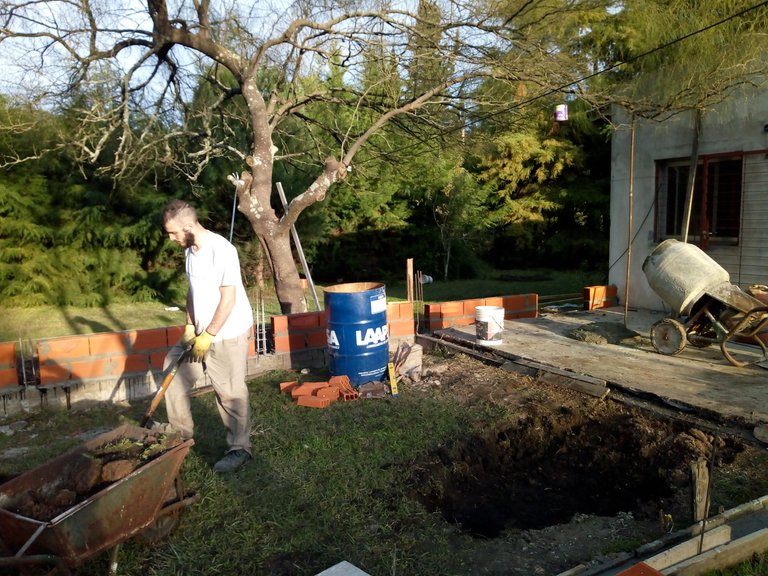
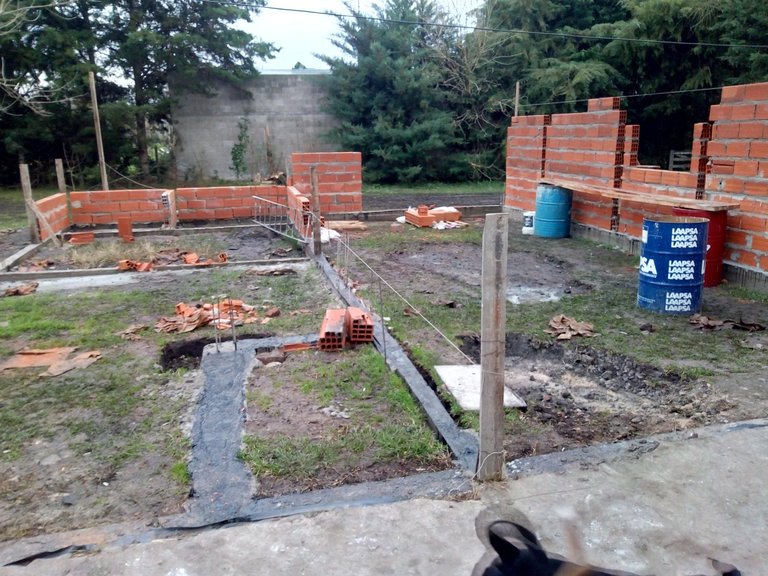
También trabajábamos de noche, prendíamos una luz o usábamos linterna ya que, en algunos casos, había que terminar el trabajo que se empezaba. Ese día lo recuerdo como si fuera hoy, fue la primera vez que aprendí la técnica del revoque. Revestí esas tres filas de ladrillos con ceresita, un aditivo hidrófugo que cumple la función de capa aisladora (es vital ya que mi ciudad posee un clima muy húmedo).
We also worked at night, we would turn on a light or use a flashlight because, in some cases, we had to finish the work we had started. I remember that day as if it were today, it was the first time I learned the plastering technique. I plastered those three rows of bricks with ceresite, a water-repellent additive that serves as an insulating layer (it is vital since my city has a very humid climate).
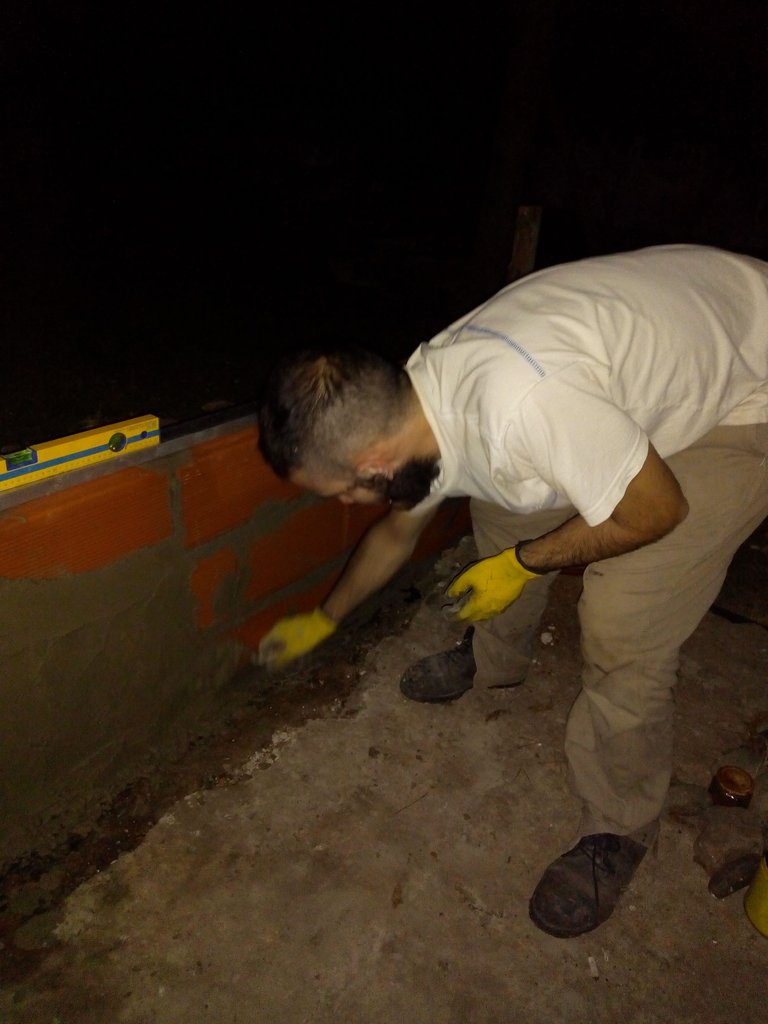
Este día también lo recuerdo muy bien, ya que hice mi primer fila de ladrillos. Esta tarea no la proseguí porque, como dije anteriormente, mi trabajo era hacer las tareas de fuerza que se necesitaba; cavar, picar el cemento, hacer la mezcla de concreto y revoque, etc. Pero, aún así, quise aprender a realizar este tipo de trabajos.
This day I also remember very well, as I made my first row of bricks. This task I did not pursue because, as I said before, my job was to do the strength work that was needed; digging, chopping the cement, making the concrete and plaster mix, etc. But, still, I wanted to learn how to do this type of work.
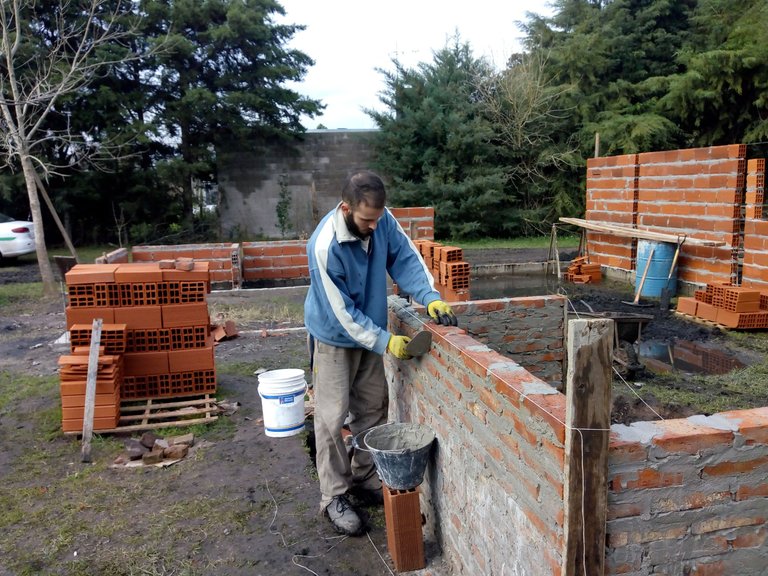
Rellené las vigas de conexión de la parrilla, encofrando y nivelando previamente. Y luego con la cuchara presionaba levemente para que el material recubra todo le interior del encofrado, y por último alisaba la superficie.
I filled the connection beams of the grill, forming and leveling previously. And then with the spoon I pressed lightly so that the material covered the entire inside of the formwork, and finally I smoothed the surface.
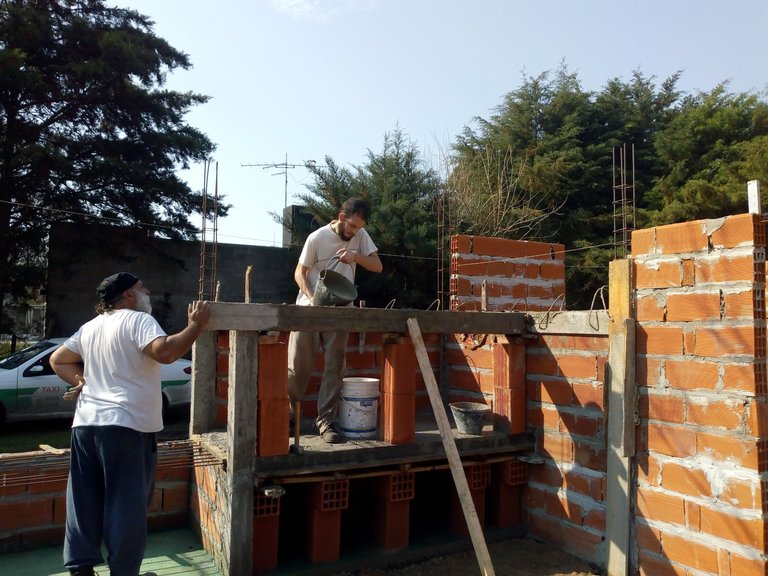
Rentamos una máquina apisonadora para, justamente, apisonar el la tosca y prepararla para la construcción del contrapiso. Las vibraciones que generaba eran muchas, tantas que, cuando frenaba la máquina, sentía en mi cuerpo la sensación de que aún seguía encendida.
We rented a tamping machine to precisely tamp down the rough material and prepare it for the construction of the subfloor. The vibrations it generated were many, so many that, when I slowed the machine down, I felt in my body the sensation that it was still on.
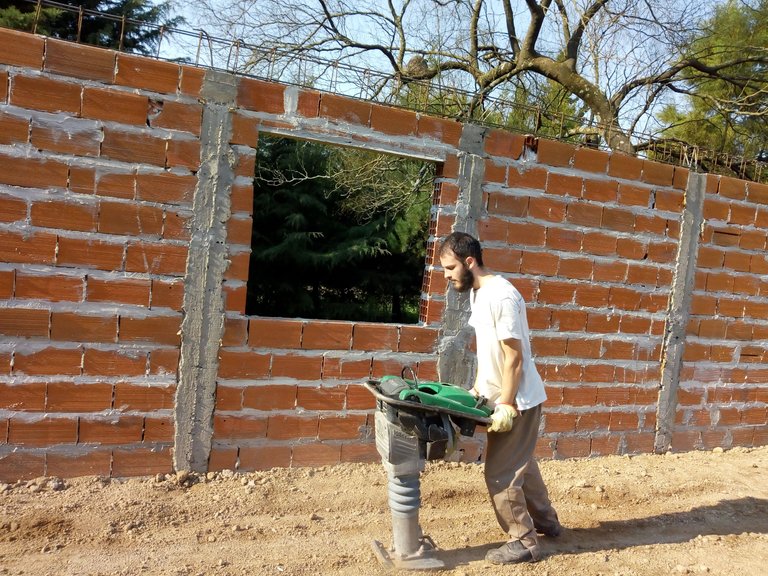
Este día lo recuerdo como uno de los más agotadores. Hicimos una primer franja de 8 metros cuadrados de contrapiso, por lo tanto según mis cálculos, cargué un aproximado de 120 baldes de escombros, pesando 16 kg cada uno, siendo esto 1/4 de mi peso corporal. En cuanto a la arena y el cemento, se encargaban de llenarlos mi papá y Leonardo. Fue una semana dura, pero la supimos vencer.
I remember this day as one of the most exhausting. We made a first strip of 8 square meters of subfloor, so according to my calculations, I carried approximately 120 buckets of rubble, weighing 16 kg each, which is 1/4 of my body weight. As for the sand and cement, they were filled by my dad and Leonardo. It was a hard week, but we knew how to overcome it.
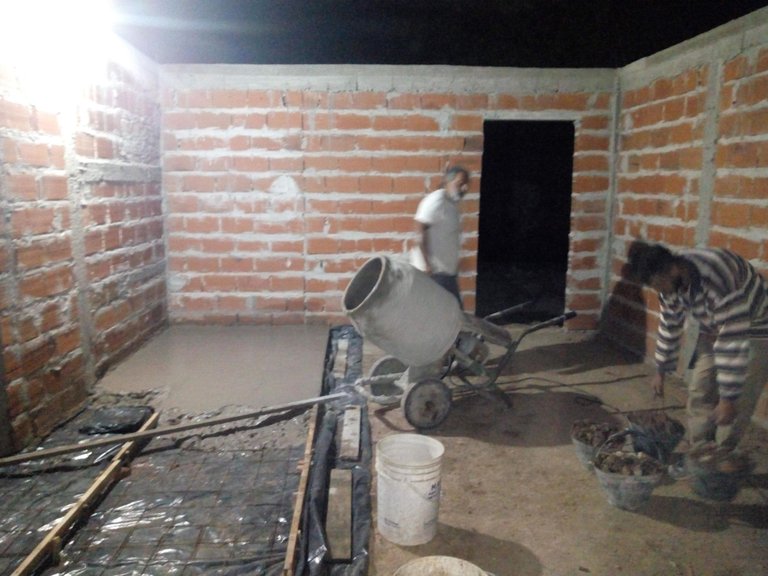
Llegó un momento en la obra en dónde, para agilizar, tuve que aprender a revocar paredes. Esta tarea la disfruté, aunque hubo días de mucho calor y recovecos que dificultaban mi tarea. Aún así, es una tarea muy útil que, como todo, me sirvió aprender ya que en cualquier momento podría necesitar de revocar alguna pared de mi casa cuando requiera mantenimiento.
There came a point in the work where, in order to speed up, I had to learn how to plaster walls. I enjoyed this task, although there were very hot days and nooks and crannies that made my task difficult. Even so, it is a very useful task that, like everything else, was useful to learn because at any time I might need to plaster a wall in my house when it requires maintenance.
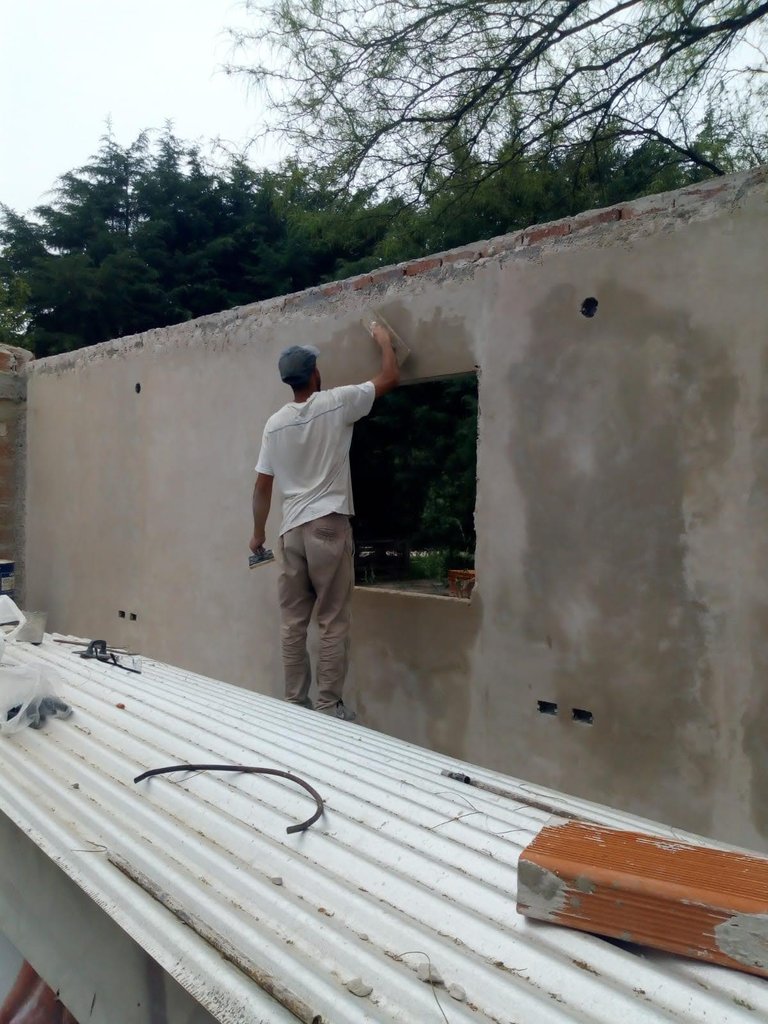
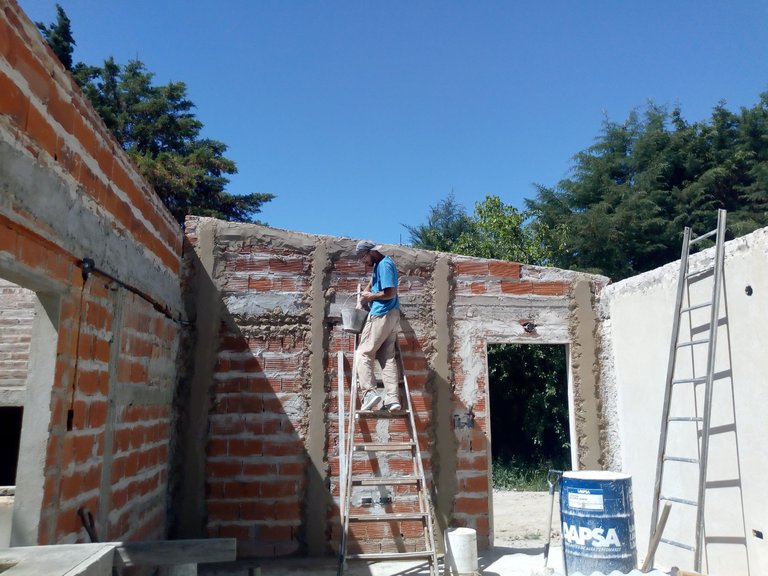

Estuvimos 7 meses trabajando, de lunes a sábados, jornada completa. Yo no vivo con mi padre desde hace varios años, por lo tanto salía desde mi casa a las 8 de la mañana y volvía a las 9 de la noche. Sólo frenábamos para almorzar y merendar, tratábamos de aprovechar el tiempo al máximo, ya que los días de lluvia eran, en su mayoría, días perdidos.
En lo personal, era la primera vez que cumplía un horario rígido de trabajo, por lo tanto fue un gran cambio para mí, al cual tuve que adaptarme. Esto no fue tan difícil ya que había estado 3 meses confinado en mi departamento, viendo al sol únicamente desde la ventana o cuando salía a hacer las compras (una vez a la semana ya que nos turnábamos con mi hermana). Por lo tanto, al comenzar a trabajar en la construcción de la casa de mi padre, estaba en contacto con la naturaleza, algo que echaba mucho de menos. Además, eso fue una gran motivación para seguir trabajando en los momentos donde mi cuerpo estaba exhausto.
We worked for 7 months, Monday to Saturday, full time. I have not lived with my father for several years, so I left my house at 8 in the morning and returned at 9 at night. We only stopped for lunch and snacks, trying to make the most of the time, since rainy days were mostly wasted days.
Personally, it was the first time I had a rigid work schedule, so it was a big change for me, to which I had to adapt. This was not so difficult since I had been confined to my apartment for 3 months, watching the sun only from the window or when I went out to do the shopping (once a week since we took turns with my sister). Therefore, by starting to work on the construction of my father's house, I was in contact with nature, something I missed very much. Also, that was a great motivation to keep working at times when my body was exhausted.
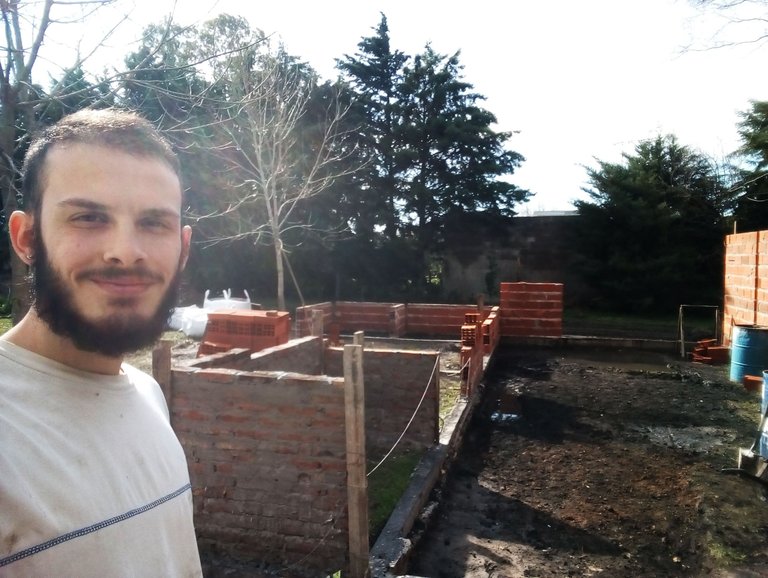
Tras experimentarlo en carne propia, puedo decir que el trabajo de albañilería es muy fatigoso e incómodo. Otra de mis motivaciones para seguir cada día, a pesar del cansancio, era porque estaba construyendo la casa para mi papá. Y él siempre dice que lo suyo también es nuestro (mis hermanas y yo). Además, constantemente estaba adquiriendo nuevos conocimientos y poniéndolos en práctica al instante.
Cada noche volvía a casa agotado, mental y físicamente, mi hermana entre risas me decía que era una especie de "zombie". Tuve el privilegio de que siempre me esperaba con la cena lista, por lo tanto yo llegaba, cenábamos, charlábamos un poco y luego me iba a dormir temprano; necesitaba descansar bien, recuperarme y recobrar fuerzas para el siguiente día. Básicamente, en mi casa sólo cenaba, dormía y desayunaba. Mi hermana fue muy importante durante aquellos meses y también fue parte de la obra ya que, sin su apoyo al cocinarme y mantener nuestra casa, no hubiera sido posible.
After experiencing it firsthand, I can say that masonry work is very tiring and uncomfortable. Another of my motivations to continue every day, despite the fatigue, was because I was building the house for my dad. And he always says that what is his is also ours (my sisters and me). Also, I was constantly acquiring new knowledge and putting it into practice instantly.
Every night I would come home exhausted, mentally and physically, my sister would laughingly tell me I was some kind of "zombie". I had the privilege that she was always waiting for me with dinner ready, so I would arrive, we would have dinner, chat a bit and then I would go to bed early; I needed to rest well, recover and regain strength for the next day. Basically, at my house I just ate dinner, slept and ate breakfast. My sister was very important during those months and she was also part of the work because, without her support in cooking for me and maintaining our home, it would not have been possible.
Ser albañil es agotador y desgastante, por eso valoro y admiro profundamente a los albañiles de vocación, los que están años o incluso toda su vida trabajando en la profesión.
Estoy profundamente agradecido a mi papá y a Leonardo, quienes me dieron la posibilidad de aprender, valorar el esfuerzo, ser más disciplinado, respetar la jerarquía y respetarse a uno mismo, siempre manteniendo la humildad, el sacrificio y el trabajo honesto.
Being a bricklayer is exhausting and exhausting, that is why I value and deeply admire the masons of vocation, those who spend years or even their whole life working in the profession.
I am deeply grateful to my father and Leonardo, who gave me the possibility to learn, to value effort, to be more disciplined, to respect the hierarchy and to respect myself, always maintaining humility, sacrifice and honest work.
A ustedes, Hivers, gracias por prestarme su tiempo al leer el resumen de mi experiencia como albañil. Podría haber detallado y explicado en profundidad cada tarea que realizada, pero decidí hacer un breve resumen para que la lectura sea amena.
To you, Hivers, thank you for taking the time to read the summary of my experience as a mason. I could have detailed and explained in depth each task I performed, but I decided to make a brief summary to make the reading enjoyable.

¡Gracias por leerme! | Thanks for reading me!
¡Gracias por leerme! | Thanks for reading me!

Separadores de texto | Text separators: Tutorialesteemit
Texto traducido en | Text translated in: DeepL
https://twitter.com/agusec1997/status/1495048174670684160
The rewards earned on this comment will go directly to the person sharing the post on Twitter as long as they are registered with @poshtoken. Sign up at https://hiveposh.com.
Hola 🙋 @agustinezequiel Agradecidos de que nos hayas compartido tu experiencia en esta labor. Sin duda, siempre hemos pensado que es uno de los trabajos más fuertes que puede haber 😓 Como tu dices, hacerlo durante toda una vida, ¡wow! Realmente trabajo duro. De seguro esos siete meses les dejaron también recuerdos y al ver el producto terminado una gran satisfacción 😃
Sería muy bueno que al título de tu post le añadieras que emoción (es) o sentimiento(s) abordas en él. Así todos nuestros queridos suscriptores sabrán 😃 y se cumple la primera norma de la comunidad 🤗
Gracias por aportar variedad a la comunidad 🌟
Gracias por el espacio y por la sugerencia, soy nuevo aquí y olvidé leer todas las reglas. Prometo que no volverá a suceder. Ya lo actualicé. Gracias a ustedes. Saludos!
Su post ha sido valorado por @goya
Muchas gracias por apreciar mi publicación. Saludos!
Wow that's e impressive, bricklaying isn't an easy job, as it's one of the skills I learn, and I know how much join and back pain I do feel each time I do it.
I'm glad you understand me. It is probably the most exhausting job, mentally and physically. I hope the joints are not serious! Best regards!
You're welcome, yea it's really exhausting, but then For us down here we gat get engage in something to make ends meet.
Yea I'm able to get over the joints pain with time.
Best wishes to you too, have a blessed day.